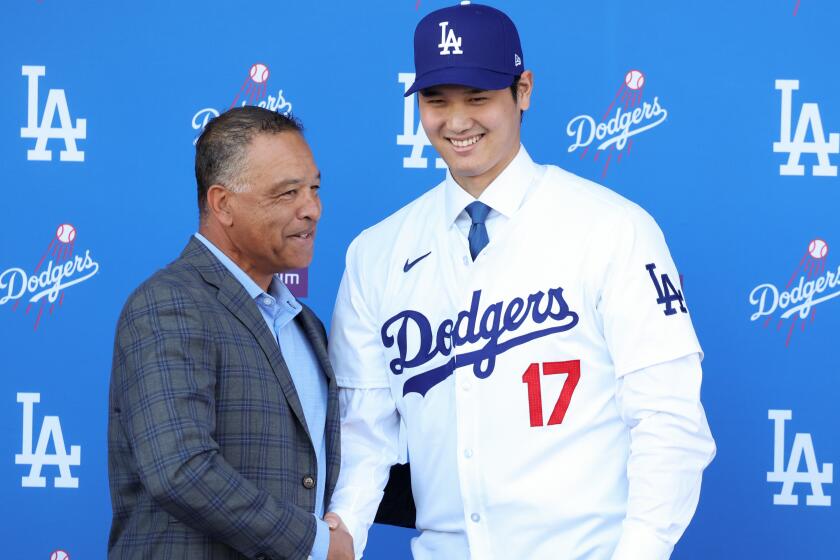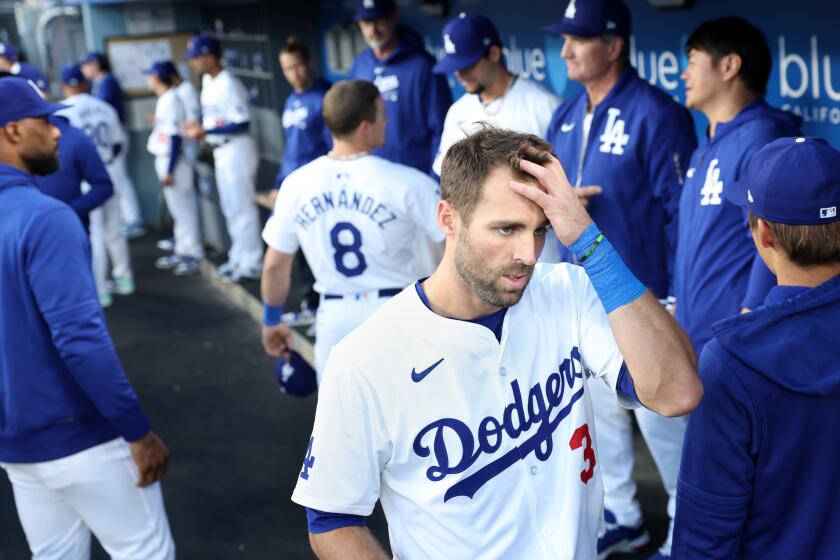Rooting out cause of his problems
SANTIAGO, Dominican Republic -- For more than a week rain had pounded the fertile farmland surrounding the Dominican Republic’s second-largest city, knocking down power lines, causing rivers to overflow and turning unpaved streets into rushing torrents of mud.
“Oh, it was terrible,” Rafael Furcal says with a shake of his head.
But it’s all better now, he adds. And just to prove it, he hustles a visitor onto the balcony of his penthouse apartment for a view of clear blue sky that seems to stretch forever.
“You should see it at night,” the Dodgers shortstop says. “It’s beautiful.”
As for his baseball future, well, that too seems to be rosy again because, just hours earlier, Furcal’s personal black cloud had also lifted. Playing for the first time since hobbling off the field in Colorado three months ago with back and ankle problems, Furcal had four hits, two runs and stole a base in a Dominican winter league game in nearby San Francisco de Macoris.
OK, so it’s not the World Series. But it’s not a bad start.
“It felt good,” Furcal says. “I feel much better.”
That’s something he could rarely say during the summer. A sore shoulder kept him on the sidelines through much of spring training, then he started the season on the disabled list with a severely sprained left ankle that never fully healed. As a result, Furcal struggled through his worst season in six years, playing only 138 games and finishing with a career-low .270 average, 25 stolen bases and 87 runs.
After matching a career high with 15 home runs and helping the team reach the playoffs in his first season in Los Angeles, Furcal managed only six last summer, when the Dodgers finished fourth in the National League West. And with their leadoff hitter hobbled, the Dodgers outscored only one NL team that finished with a winning record and out-homered three of 30 big-league teams.
“I don’t think any lineup would be productive without the leadoff hitter being able to get on,” Dodgers General Manager Ned Colletti said. “Obviously he’s a key player for our club. We saw the difference he made.”
Five mornings a week Furcal steers his silver Mercedes through Santiago’s pothole-riddled streets to a downtown gym where a trainer from his winter league team, Aguilas de Cibao, gives him a massage, applies ice and heat and puts Furcal through a series of strength and flexibility exercises.
“I feel like I’m getting back to my game. Steal a base, bunting, running,” he says. “It’s tough when you’ve got a bad injury and you can’t even stand up at home plate. I felt so disappointed with myself.”
For the most part, however, he suffered in silence. Although the Dodgers’ trainers and confidants such as infield coach Mariano Duncan knew he was in pain, few others, even teammates, knew how badly he was hurt.
His wife, Glenny, knew because Furcal’s silence spoke volumes.
“When he feels hurt, he never says anything. He just stays quiet. But at the same time, I know that he was expecting more and he was getting frustrated,” she says, sitting in the living room of the couple’s sprawling two-story, 11th-floor penthouse.
“He wanted to do more [but] he was scared to say something because he felt like maybe people wouldn’t believe that he was hurt,” Glenny remembers of the long, quiet nights in their La Canada home. “It was really bad. He would come home sad. When Raffy can’t play well, he gets frustrated.”
So Furcal sought solace in his 1-year-old son Rafael Jr. and Glenny, a former New Yorker he met during his final spring training with the Braves.
“I didn’t know anything about baseball. And I still don’t,” she says. “Sometimes I’ll ask Raffy a question and he’ll just laugh. I thought it was really boring.”
But Furcal won her over with two simple gestures -- a surprise call on her birthday and a visit home to meet his parents.
“When I met his family and I saw the way that he was treating his mom, I said, ‘Oh, wait a minute. This is a man who could really make a family,’ ” she recalls.
Which is why she was one of the few people who wasn’t happy to see Furcal back in uniform this week. “We don’t have enough time [together] in L.A. Now he’s playing here, he’s not going to spend time with his family,” she says. “It’s another job. I never told him anything, but I was sad.
“But if he needs it and he feels happy doing it, then I have to go ahead and be with him.”
Furcal grew up near the Haitian border in Loma de Cabrera, a dusty village of less than 7,000 split by the Dajabon River -- a river most locals know as the rio masacre because its shallow waters have frequently flowed red with blood from massacres dating back more than 300 years, to when French and Spanish colonizers fought along its banks.
Furcal’s father, Silvio, built a reputation as a standout left fielder in an era when major league scouts ignored the Dominican Republic. But he would make up for that by sending all three of his sons to the U.S. to play baseball.
Manuel, who died in an accident eight years ago, pitched in the minor leagues for the Seattle Mariners. Lorenzo, an infielder signed by Hall of Fame pitcher Juan Marichal, played two years in the Oakland Athletics’ system until he broke an arm, then a leg, and decided to retire.
Rafael, however, rocketed through the minor leagues, playing just one full season there before landing in Atlanta and winning the National League rookie-of-the-year award in 2000.
“There were three of us. One had to make it to the major leagues,” Lorenzo says with a shrug.
It almost didn’t happen. Although Rafael was the family’s last hope in baseball, he was ready to start engineering school before scout Felix Francisco spotted him at a tryout in Santo Domingo and offered him $5,000 to sign with the Braves.
Furcal managed to pocket only $2,800 of his bonus, but that was enough to buy a car for his parents. Five years later he bought them a house, and now his father manages much of the farmland Furcal bought after signing a three-year, $39-million free-agent contract with the Dodgers two years ago.
That contract expires after this season. If Furcal, who turned 30 in October, wants to sign another one that big he’ll have to return to being the kind of dependable and disruptive offensive force he was before the injuries, one who averaged more than 150 games, 108 runs and nearly 33 stolen bases over the previous five seasons.
“I don’t like to put pressure on myself like that,” Furcal says when asked about his future.
But that’s not to say he isn’t taking things seriously. Furcal’s comeback game last weekend -- in which he played second base, not short, to ease the strain on his shoulder -- was his first in winter league play since signing with the Dodgers in 2005.
“We were encouraged that he wanted to play winter ball,” says Colletti, who believes Furcal may have tried to rush himself into shape the last two springs after taking the winter off.
And if he can stay in shape, Furcal’s hoping that will keep the down time to a minimum. With former Braves teammate Andruw Jones anchoring the middle of the lineup, Furcal believes the Dodgers are much more potent than they were a year ago.
“We’ve got a guy that can hit 40 homers, 100 RBIs. That’s what we’re looking for. That’s what we need,” says Furcal, who has played in the postseason six times in an eight-year career yet never in the NL Championship Series or World Series.
“It’s tough for me because the World Series is the best. Every player wants to be in the World Series,” he says. “Sometimes it depends on luck. I think sometimes I don’t have luck.”
But he does have a healthy ankle. And that’s a good start.
More to Read
Are you a true-blue fan?
Get our Dodgers Dugout newsletter for insights, news and much more.
You may occasionally receive promotional content from the Los Angeles Times.







